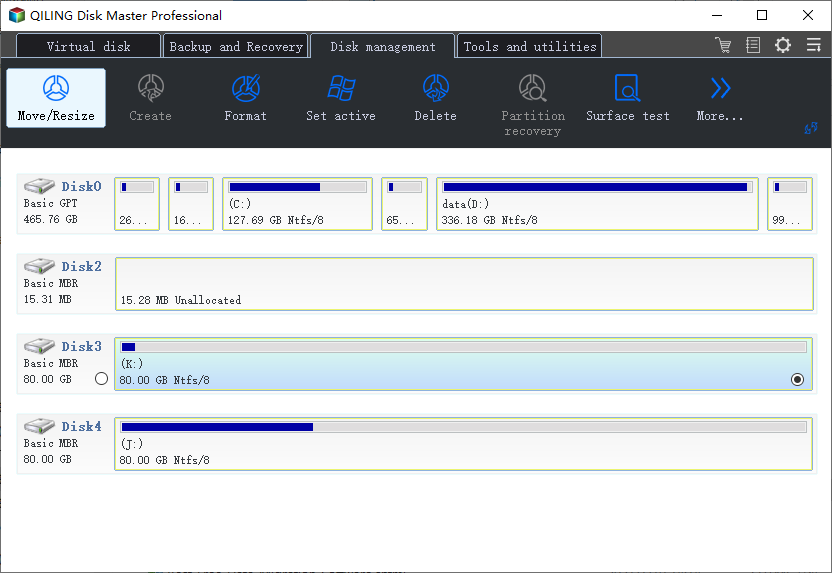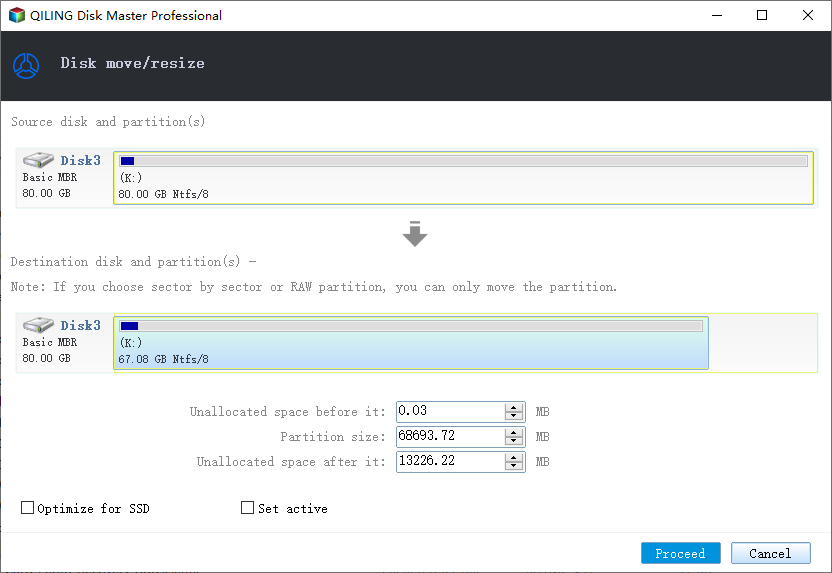How to Shrink Partition in Windows 11/10
Shrinking a partition is needed when you want to create a new volume or extend another volume on the same disk. In most cases, you can shrink the partition directly without worrying about data loss. For coping with this hassle, we hold three solutions to shrink volume in Windows 11/10.
3 Ways to Shrink Partition in Windows 11/10
Generally, users use three ways to shrink Windows 11/10 partition, third-party software, Disk Management, or DiskPart. Any of them can help you do the Windows 11/10 shrink partition. So, which method is best?
For seeking an easest way, Qiling Partition Master is the "One Size Fits All" solution for you, which allows you to shrink volume flexibly, even shrink the non-adjacent space. While Disk Management and Diskpart still run well, but adopting Diskpart may eat up your time than the third-party software. And the Windows built-in tool also holds limits. Stay here and pick a meaningful tool!
Important
If you want to shrink a RAW partition, you may destroy the files in it. Thus, if the partition you want to shrink has a RAW file system, you are recommended to perform RAW data recovery, and then carry out one of the methods below to shrink your Windows 11/10 partition.
Method 1. Shrink Windows 11/10 Partition with Qiling Partition Master
Suppose you prefer to shrink a partition in Windows 11/10 by the most straightforward step like dragging and dropping, in that case, the partition resizing tool - Qiling Partition Master allows you to escape the redundant process. Whether you want to shrink or extend a partition, you can directly drag the volume to the size you want instead of entering the size in number.
Step 1: Locate and select target partition to shrink
On the main window, click on the partition that you want to shrink and select "Resize/Move".

Step 2: Adjust to shrink partition
Use your mouse to drag one of its ends to shrink partition space.
You can also adjust the partition size box to shrink the target partition. Once done, click "Proceed" to continue.

Qiling Partition Master is the professional partition management software to extend or shrink Windows 11/10 partition without data loss. It also has other disk management features like merging partitions, formatting partitions, converting MBR to GPT disk, and more.
Extend C drive or system partition in Windows 11/10
How to extend C drive or system partition in Windows 11/10? Powerful partition manager - Qiling Partition Master can easily resize/move/merge/split partition in Windows 11/10.

Method 2. Shrink Partition with Windows 11/10 Built-In Disk Management
Windows 11/10 built-in Disk Management enables you to view and manage your disk drives. It can shrink volume and extend volume. However, it doesn't support the shrink operation on your non-adjacent space.
Step 1. Right-click on "This PC", choose "Manage", and choose "Disk Management" in the pop-up window.
Step 2. Then you need to right-click on the partition which you want to shrink, and choose "Shrink Volume..."
Step 3. In the dialog box, set the amount of space to shink and click "Shrink".
Step 4. After shrinking the partition, you will create more free space on your disk. Then you can create a new volume or extend a partition as you like.
Notice:
With Disk Management, you can only shrink a RAW partition or NTFS partition on a basic volume. Thus, if the target partition falls outside the category, you need to use one of the two other ways to shrink partition in Windows 10.

Method 3. Shrink Partition in Windows 11/10 Using DiskPart
Although using DiskPart to shrink Windows 11/10 volume is practical, it's a relatively complicated method among the three. In case you need it, we also detail the steps here as an alternative way.
Step 1. Click the "Start" button and type cmd.
Step 2. Right-click "Command Prompt" and choose "Run as administrator". In the prompt, click "Yes" to continue.
Step 3. To shrink a Windows 11/10 partition, enter the following commands in order:
- diskpart
- list volume
- select volume 1 (the volume number of the partition you want to shrink)
- shrink desired=123464 (the amount of space in megabytes you want to shrink your partition to)
Pick the Best Solution
As you can see from the details above, using Qiling partition tool and Disk Management is much easier than using DiskPart. However, there are limits on the partition you can resize while using Disk Management. Thus, Qiling Partition Master can meet the needs of more users.
Besides, after the shrink operation, most of you will create a new partition or extend an existing partition. If you want to extend a partition with a non-adjacent space, using a third-party tool is your only choice because Disk Management doesn't support such operations.
Related Articles
- All You Want to Know about exFAT, FAT32, and NTFS
- 6 Best Hard Drive Disk Format Tool | HDD Format Tools
- How to Stop Disk Check (CHKDSK) on Startup Windows 10
- Solved: Can't Remove Windows.old Folder in Windows 11/10